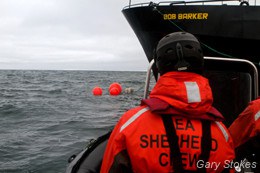The crew on board the Sea Shepherd ship Bob Barker have recovered illegal unmarked longlines and buoys in the southern ocean set to target an endangered species, the Patagonian toothfish, also known and marketed as Chilean sea bass. A vessel was seen in the distance, but when hailed by radio fled from the Bob Barker.
"It is illegal to set buoys, lines, and nets without identification numbers or the name of the vessel. This along with the fact that the vessel failed to respond to the calls from the Bob Barker and immediately fled the scene, were all clear indications that the ship was poaching. The fishing vessel's name, flag, and identification numbers could not be identified due to the long distance between it and the Bob Barker." said a report from Bob Barker's Captain Alex Cornelissen.
Sea Shepherd have three ships patrolling the southern ocean in their campaign to stop Japanese commercial whaling fleet operating under the guise of scientific research in an internationally designated whaling sanctuary. The Steve Irwin called in on the town of Bluff in New Zealand on December 20 to acquire an essential component for the helicopter on board, and also took on more fuel and fresh food.
Sea Shepherd's latest addition, the 30 metre Gojira, departed Hobart on December 20 with 11 crew. The Gojira has greater speed than the harpoon vessels in the Japanese whaling fleet. Locky MacLean, captain of the Gojira told ABC news "The Gojira will allow us to find the fleet early on in the season and cut down their kill quotas right off the bat," he said. "We reckon we can be down there before they get there and if we can find them, you know, before they commence their whaling operations they may not even get a chance to start whaling this season."
Patagonian toothfish are slow growing long lived species that are vulnerable to overfishing. While there are a few companies certified to fish for this species in controlled manners, most of the fish on the market comes from illegal poaching operations such as the one which the Bob Barker interrupted.
The Patagonian toothfish is commonly sold as: Merluza negra (Spain) Bacalao de profundidad (Spain and Chile) Chilean Sea Bass (US and Canada) Legine (France) Mero (Japan) Patagonian toothfish (UK) Butterfish (Mauritius).
Seafood Watch in the US advises consumers to avoid buying the fish under its various marketed names as it is likely to be sourced from illegal fishing. The Environmental Defense Fund in the US also advises consumers to avoid the fish on environmental and health grounds as the fish often contain elevated levels of mercury.
Sea Shepherd have encountered Patagonian and Antarctic toothfish poachers previously and have documented and disrupted the illegal fishing activities when able to do so such as in 2006 and in 2008.
Illegal fishing activity in the southern ocean is notoriously difficult to detect, and then successfully prosecute. In 2003 the Australian Fisheries and Customs patrol vessel Southern Supporter found the Uruguayan registered longliner Viarsa 1 fishing near Heard Island in the Australian Economic exclusion zone. The Viarsa 1 refused to stop when ordered to do so and was chased for 21 days before the trawler was boarded by Australian authorities and then escorted back to Fremantle. In Fremantle the ship was impounded and the Captain and senior crew were charged with illegal fishing in Australian waters. Despite the 97 tonnes of toothfish found on board the vessel, the owners of Viarsa 1 were able to secure an acquittal by jury in a second trial in November 2005, with the Captain and crew free to return to their home countries. The first trial had resulted in a hung jury decision.
Background:
- A history of the Patagonian toothfish fishery (2001 - Australian Antarctic Division)
- Wikipeadia: Patagonian toothfish
- TRAFFIC - Illegal Toothfish still on the plate (2008)

